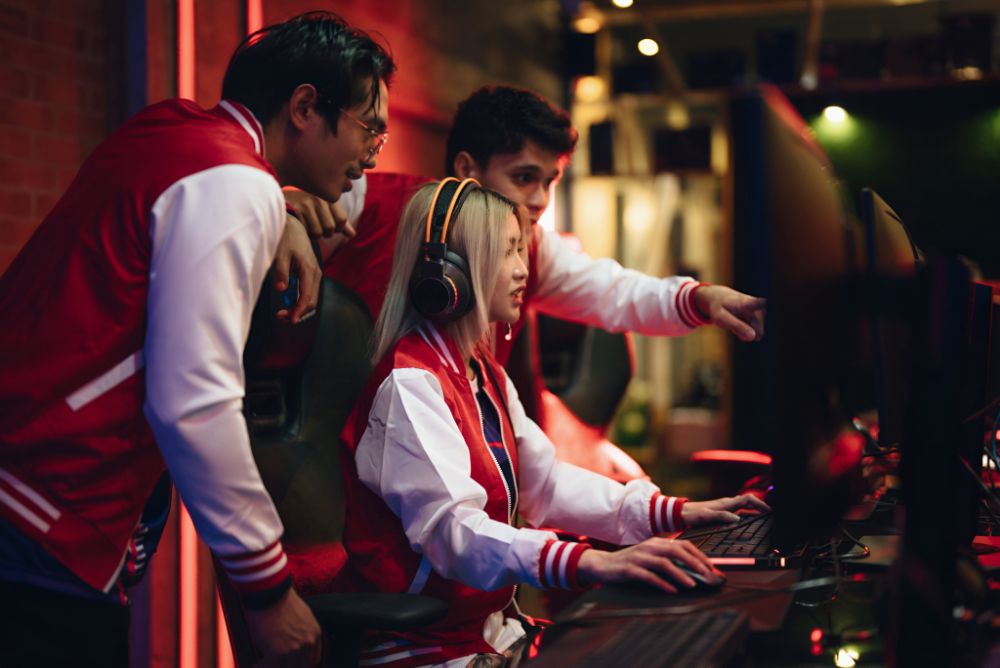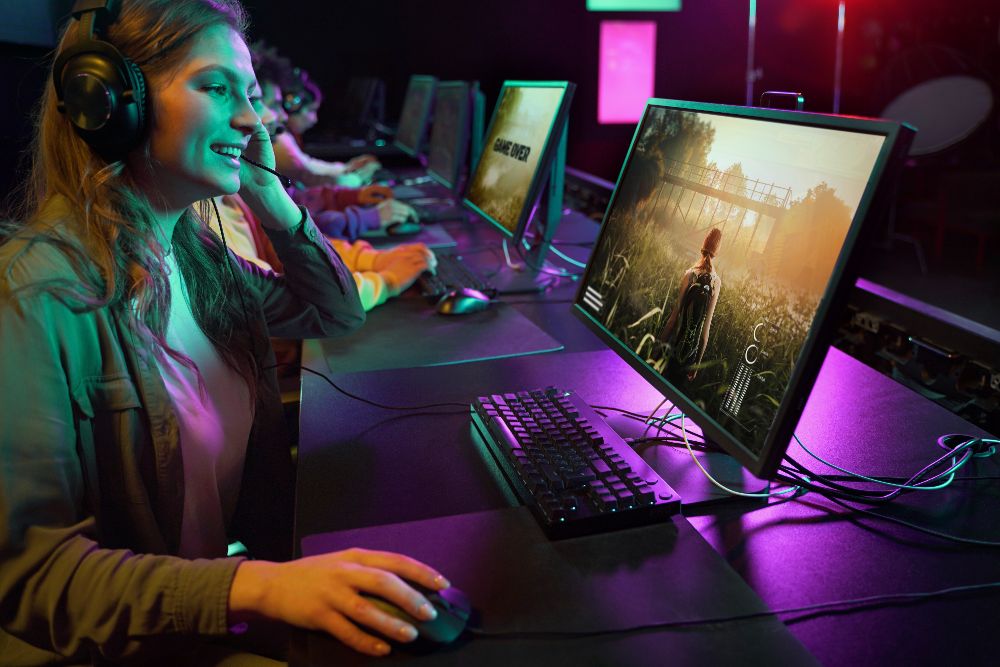To build a successful esports team, you need to start by defining your team’s goals, whether it’s competing at the highest level or creating a community-focused group.
Choosing the right game that aligns with your objectives and attracts dedicated players is essential. Recruiting skilled players who fit well within their roles is the next step, emphasizing teamwork over individual prowess.
Establishing a structured training regimen will help enhance skills and foster collaboration.
Securing sponsorships involves creating a professional brand that appeals to potential sponsors. This includes having a clear value proposition and demonstrating consistent performance and engagement.
Engaging with the community through social media, streaming platforms, and live events can help build a loyal fan base and increase visibility.
These actions collectively contribute to solidifying the team’s presence and support.
Key Takeaways
- Define team goals using SMART criteria and align ambitions through effective communication.
- Choose a popular game with a strong competitive scene and growth potential.
- Recruit skilled players through tryouts, focusing on mechanics, teamwork, and commitment.
- Establish clear team roles, including a strategic shot-caller and secondary responsibilities.
- Develop a tailored training regimen with regular practice sessions and feedback mechanisms.
Define Your Team’s Goals
Defining your team’s goals is crucial for establishing a clear direction in your esports journey. It’s essential to determine the specific outcomes you aim to achieve as a team. These goals could range from winning local tournaments to competing in international events. Clearly defined goals provide a roadmap for your team and help maintain focus.
Establish both short-term and long-term objectives. Short-term goals might include enhancing individual skills, refining specific strategies, or gaining experience in smaller competitions. Long-term goals could involve advancing in online leagues or obtaining sponsorships. It’s advisable to use the SMART criteria—specific, measurable, achievable, relevant, and time-bound—when setting these goals.
Effective communication is a key component in this process. It’s important to discuss and align on collective ambitions with all team members. Ensuring that everyone understands and commits to these goals fosters unity and improves team morale, as it aligns everyone’s efforts toward a common objective.
Regular review and adjustment of your goals are also necessary. As the team progresses and evolves, objectives may need to be updated to reflect new circumstances and aspirations. Keeping goals current ensures that the team remains motivated and adaptable in the ever-changing landscape of esports.
Check out our article The Importance of Team Dynamics in Esports to learn more.
Choose the Right Game
Choosing the appropriate game is a crucial step in establishing a successful esports team. Several factors should be considered to make an informed decision.
First, consider the popularity and competitive scene of the game. Games such as League of Legends, Dota 2, and Fortnite have well-established tournaments and extensive fan bases, which can offer more opportunities for exposure and competition.
Next, assess the game’s potential for growth. Emerging games may present less competition initially, allowing a new team to ascend quickly. However, they also carry the risk of not achieving long-term popularity or stability.
Consider your own expertise and interest in the game. A strong personal connection to the game can lead to increased commitment and a deeper understanding, which may enhance team performance.
Recruit Skilled Players
Recruiting skilled players is a fundamental step in building a successful esports team. The process begins with scouting talent through online leaderboards, tournaments, and forums related to the specific game of interest. It’s important to identify players who consistently achieve high rankings and demonstrate strong teamwork capabilities. Emphasis shouldn’t solely be on raw skill; effective communication and synergy among team members are also crucial.
Following the scouting phase, organizing tryouts can help evaluate potential team members in a controlled setting. These tryouts should include scenarios that simulate high-pressure situations to observe how players respond. The goal is to find individuals who remain composed and make strategic decisions under stress.
During this evaluation, it’s essential to assess not only mechanical skills but also game sense, adaptability, and the ability to collaborate with others.
Once promising candidates have been identified, conducting interviews can provide further insight into their goals, commitment levels, and personalities. Questions should cover their previous experiences in competitive gaming and their methods for handling conflicts. The objective is to form a cohesive team, rather than assembling a group of individual star players.
By the way, take a look at our article https://bet-of-the-day.net/2024/10/02/how-to-monetize-your-gaming-skills/
Establish Team Roles
Assigning specific roles within an esports team is essential for optimizing performance and ensuring smooth coordination during gameplay. Begin by identifying the key positions required by the game. For example, in League of Legends, the main roles include top laner, mid laner, jungler, ADC, and support. Each team member should play to their strengths, making it necessary to analyze their skills and preferences.
Effective communication is critical in esports. Designate a shot-caller who can make quick decisions and direct the team during high-pressure situations. This individual needs to think strategically and remain calm under pressure. Ensuring that everyone understands their responsibilities will help avoid confusion during matches.
Secondary roles shouldn’t be overlooked. It may be beneficial to have someone manage social media, another person review game footage, and someone else handle team logistics. These roles contribute to maintaining team focus and enhancing overall performance.
Regularly revisiting and adjusting roles as needed is important. Players might develop new skills or excel in different areas over time. Flexibility can be advantageous, allowing the team to adapt to new challenges and strategies effectively.
Establishing clear roles provides a solid foundation for an esports team’s success.
Develop Training Regimen
To develop an effective training regimen, start by evaluating your team’s strengths and weaknesses.
Schedule regular practice sessions to hone skills and build cohesion.
Assess Team Strengths
Before initiating a training regimen, it’s essential to assess your team’s strengths to tailor practice sessions effectively. Start by evaluating each player’s skills across various aspects of the game. Identify who excels in strategy, who’s the fastest reflexes, and who communicates best. This analysis will help you understand the roles each player is naturally suited for and identify areas where they may need improvement.
Next, consider conducting mock games or scrimmages. These sessions offer real-time insights into how well your team collaborates. Observe their coordination, decision-making, and adaptability under pressure. Recording these sessions for review can help pinpoint both individual and collective strengths.
Additionally, gather feedback through one-on-one discussions or team meetings. Allow players to share their perspectives on their own strengths. This approach not only boosts morale but also ensures that no hidden talents are overlooked.
Use this comprehensive assessment to develop a balanced training regimen. Focus on enhancing these strengths and integrating them into your overall strategy. A team that understands and leverages its strengths is more likely to perform effectively against the competition.
Schedule Practice Sessions
Regular scheduling of practice sessions is critical for establishing a strong training regimen for an esports team. The first step is to create a consistent schedule that aligns with everyone’s availability. Whether the sessions occur daily or several times a week, consistency is key for developing muscle memory and enhancing teamwork.
It’s also important to balance practice with rest periods to prevent burnout.
Structured sessions should be organized to maximize efficiency. Practice time should be divided into specific segments that address different aspects of gameplay. For example, one segment could focus on individual skills, another on team coordination, and another on scrimmages against other teams. This approach ensures comprehensive development across various areas.
Incorporating feedback mechanisms is also vital. After each session, the team should gather for a brief debriefing. This discussion should cover what strategies were effective, which ones were not, and identify areas needing improvement. Such debriefs keep the entire team aligned and promote a culture of continuous learning.
Tools like calendars and communication applications are useful for maintaining organization and accountability. A shared calendar helps ensure that no one misses a session, while communication apps facilitate coordination of last-minute changes and the sharing of insights.
Analyze Game Strategies
Analyzing game strategies is essential for developing an effective training regimen for an esports team. It involves examining both your team’s gameplay and that of your competitors.
Start by recording matches and reviewing them with your players to identify what strategies were successful, which ones failed, and the underlying reasons for these outcomes. Look for patterns in play styles and decision-making processes.
Next, delve into specific elements such as map control, resource management, and team coordination. Discuss these aspects during team meetings and emphasize them in practice sessions. Encourage players to ask questions and critically evaluate their choices.
Additionally, study professional matches and tournaments to understand how top-tier teams approach the game. Analyze their strategies and consider how these tactics can be adapted and incorporated into your own team’s playbook.
Secure Sponsorships
Securing sponsorships is a crucial aspect of developing a successful esports team. To begin, it’s important to identify potential sponsors that align with your team’s values and target audience. Brands that are already involved in the gaming or technology sectors may be more inclined to invest.
Developing a well-structured pitch is essential when approaching potential sponsors. This pitch should emphasize your team’s achievements, social media reach, and engagement metrics. It’s important to clearly articulate the benefits that sponsors will receive from collaborating with your team, such as branding opportunities including logos on jerseys, shout-outs during streams, and mentions in social media posts.
Networking plays a significant role in securing sponsorships. Attending industry events, tournaments, and expos can facilitate face-to-face interactions with potential sponsors, which can be more impactful than virtual communication alone. Following up with emails and phone calls is essential to maintain and advance these conversations.
Offering different tiers of sponsorship packages can accommodate various budgets and demonstrate flexibility. Being open to negotiation can help create a partnership that’s beneficial for both parties.
Providing clear, detailed, and factual information throughout the process can enhance credibility and foster a successful sponsorship relationship.
If you are interested in The Role of Sponsorships in Esports, read this article:https://bet-of-the-day.net/2024/10/02/the-role-of-sponsorships-in-esports/
Conclusion
Now that you know the steps to build an esports team, it’s time to take action. Define your goals, choose the right game, and recruit skilled players who fit well into their roles. Establish a solid training regimen and secure sponsorships to support your team. Remember, teamwork and community engagement are key. With dedication and strategic planning, you’ll set your team on the path to competitive success. Go out there and make your mark in the esports world!



